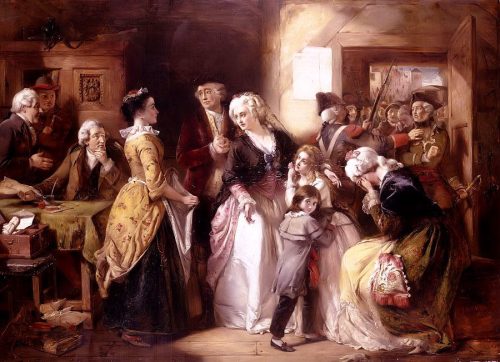
Princess Marie-Thérèse (1778-1851) was the oldest child of Louis XVI and Marie Antoinette. During the French Revolution, Marie-Thérèse lived with her family at Versailles and the Tuileries. After the execution of her father, the young princess was imprisoned with her mother and younger sisters in the Temple. She remained there for almost three years, unaware of the fate of her family. Marie-Thérèse was released in December 1795 and fled France, living in exile in Austria and Russia. She later married her cousin, the Duke of Angoulême, who himself became King of France, though only for a few minutes.
The following account of the royal family’s June 1791 flight from Paris and arrest at Varennes comes from the 12-year-old princess’ journal:
“During the whole of June 20th 1791, my father and mother seemed very busy and much agitated, but I did not know the reason. After dinner, they sent my brother and me into another room and shut themselves up alone with my aunt. I have since learned that it was then that they conveyed to my aunt their intention to escape.
At five o’clock my mother took my brother and me… to Tivoli, Monsieur Boutin’s house at the end of the Chaussee d’anton. While walking there, my mother took me aside and told me not to be alarmed, whatever might happen, that we should never be long separated and would soon meet together again. My mind was confused and I did not understand what she meant…
At seven o’clock we came home and I retired to my own apartment, very melancholy… I was hardly in bed when my mother came; she had desired me to send everybody away under the pretence of being indisposed, and to keep but one woman with me. She told this woman and me that we must set off instantly and told us how to proceed…
At half-past ten, when we were all ready, my mother herself conducted us to the carriage in the middle of the court, which was exposing herself to great risk… To deceive that anyone might follow us, we drove around several streets [then] returned to the Little Carousel, which is close to the Tuileries. My brother was fast asleep in the bottom of the carriage, under the petticoats of Madame de Tourzel. We saw Monsieur Lafayette, who had been at my father’s apartment, go by. There we remained waiting a full hour, ignorant of what was going on. Never did time appear so tedious…
My father arrived soon after and then my mother, with one of the bodyguards who was to accompany us. We then proceeded and reached the barrier without any event. There a travelling carriage had been prepared for us… We all proceeded on our journey, day beginning to dawn.
During the morning nothing particular occurred… At Etoges, we thought we were known. At four o’clock we passed through Chalons-sur-Marne, a large town; there we were certainly known. Several persons thanked God for the pleasure of having seen the King and expressed their anxiety for his escape… At the close of the day, we passed through Clermont… An officer recognised my father and, coming close to the carriage, whispered to him that he was betrayed…
We continued our journey… We were now at the entrance of the village of Varennes, which contains scarcely a hundred houses… When we got into the village, we heard alarming shouts of ‘Stop! Stop!’
The postillions [coach drivers] were seized and in a moment the carriage was surrounded by a great crowd, some with arms and some with lights. They asked who we were and we answered Madame de Korff and her family. They trust their lights into the carriage, close to my father’s face, and insisted on us stepping out. We answered that we would not, that we were common travellers and had a right to get on. They repeated their orders to step out, on pain of being put to death, and at that moment all their guns were levelled on our carriage.
We then alighted and while crossing the street, six mounted dragoons passed us. Unfortunately, they had no officer with them; if there had been, six resolute men would have intimidated them all and might have saved the King.”
